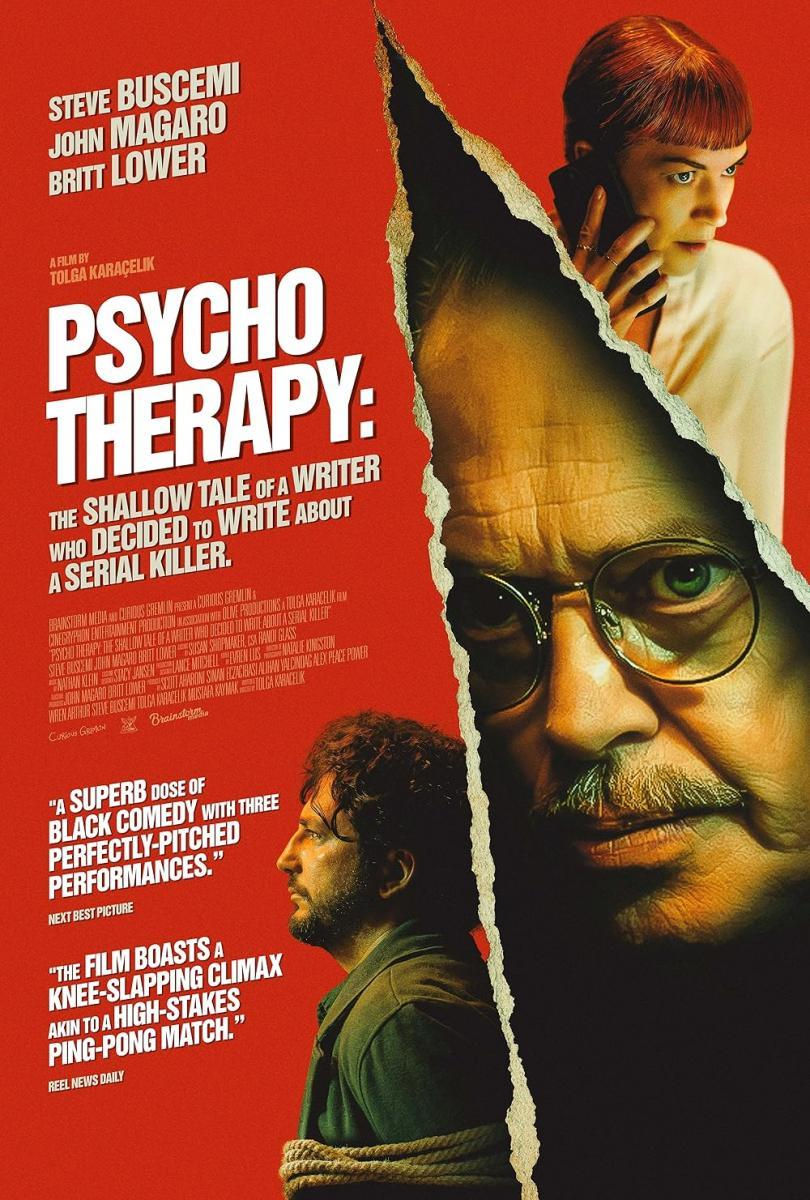‘Psycho Therapy ’ (2024)
- kinotesreviews
- Aug 24, 2025
- 3 min read

Largely summarising the plot of the film, the full title of the feature - ‘Psycho Therapy: The Shallow Tale of a Writer Who Decided to Write About a Serial Killer’ – conveys in essence the narrative and partially the tone of the film. Following Keane (John Magaro) as he struggles to write his second novel and faces marital struggles with spouse Suzie (Britt Lower), the aspiring writer crosses paths with Kollmick (Steve Buscemi) a self-professed serial killer, who invites Keane to write about his murderous ventures.
Laying down a darkly comedic tone, the film sets out by introducing Keane and Suzie as they dine with a group of friends. Rambling a little, Keane clumsily relays the idea behind his second novel, four years in the making, much to Suzie’s chagrin. Stumbling awkwardly through the evening, Suzie’s embarrassment of Keane makes it easier for her to ask him for a divorce once they’re home later that evening.
Shocked, Keane finds himself drinking at the local watering hole where he is approached by Kollmick. Without undue delay, Kollmick reveals his identity as a serial killer and asks Keane to write his next book about him. In disbelief, but agreeing to the proposal, Keane and Kollmick make their way to Keane’s where they’re confronted by Suzie.
Trying to mask the situation, Keane lies about Kollmick being a counsellor, with Suzie mistaking this as a gesture from Keane to save their marriage. With Suzie agreeing to the ‘marriage counselling’, Keane and Kollmick work on writing the book whilst also lying to Suzie about Kollmick’s identity.
Highly amusing, the film divides its time between Kollmick teaching Keane about his serial killer tactics and how he has managed to evade the authorities for years, whilst also shifting the dynamic drastically when Kollmick, Keane and Suzie sit down for their ‘counselling sessions.’
The film leans into its uncategorizeable characteristics and relies on the more than capable cast playing off of each others awkward, quick-witted and sharp deliveries, masterfully rendering a dark comedy of wild circumstances. Relying on the apt cast, ‘Psycho Therapy’ follows its characters and explores the power dynamics that exist between the spouses and also between Kollmick and Keane.
With John Magaro’s Keane trying to appease both Kollmick and Suzie, the character may sound pitiful on the page, but Magaro delivers a man confused and struggling, yet exhibiting signs of capability when in dire situations. Lower’s Suzie and Buscemi’s Kollmick are more alike than not, with both showcasing a strategic and calculated approach to everything they do. All together, the threesome provide for and unexpectedly facetious yet serious tone, swinging from comedy to suspense in the most abrupt yet enjoyable ways.
Jumping from one disastrous situation to another, the stakes of the film grow exponentially as it reaches its apex. With a situation that results in Keane and Kollmick having kidnapped three people, Suzie is hot on their heels and joins the two as she investigates their activities. Ultimately resolving in an unanticipated turn where Suzie opts to play the part of a killer and takes a man’s life, the film chooses to finish the story, leaving it up to the audience to speculate on where the characters my go from there.
A little short, the finale of the feature may be too demanding of some, not providing a clear resolution to the journey for everyone involved. Conversely, the feature highlights that the key to all of this is the journey, rather than the destination, with writer and director Tolga Karaçelik marking his English language feature debut as a success when it comes to subverting expectations and producing a truly engaging story.
Worth while, enthralling and suspenseful, ‘Psycho Therapy’ delivers on multiple fronts with excellent writing, a superb cast and well situated in mostly dimly lit streets of New York. Exploring the world and mind of a serial killer whilst also dealing with interpersonal drama between husband and wife, the film shifts its tone often whilst successfully balancing its delivery, making the feature a wild ride that doesn’t slow down until the very end.
Score: 3/4




Comments